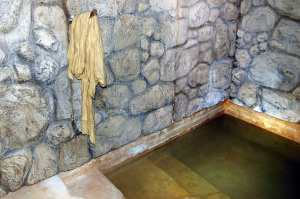I fully understand your predicament, and this is a serious question. Let’s take a look at the sources in Jewish law, halacha, and try to resolve your question.
The “Code of Jewish Law” rules that the building of a mikvah is an obligation upon the entire community, not only those who need to use it. Since it’s a necessary institution for those who need it, a mitzvah obligation, it is incumbent upon all community members to ensure its availability for those women. Jewish law further elevates the obligation of building a mikvah over building a synagogue. This is derived from a Talmudic ruling that one should even sell one’s Torah scroll, if necessary, to have the funds to get married and be able to fulfill the mitzvah of “be fruitful and multiply.” We derive from here that a community should even sell the only synagogue in town to use the funds to build a mikvah, if necessary and the money cannot be raised in another way.
Even if a mikvah is already built and basically functional, its renovation and beautification would precede the renovation of a synagogue. This is because halacha states that building a mikvah precedes that of a shul even if there is a mikvah available but it’s inconvenient to use. This is because there will probably be women who will refrain from the fulfillment of this mitzvah due to the inconvenience or unattractive appearance. Similarly, if a mikvah has fallen into disrepair over time, although basically functional, if it doesn’t provide an enjoyable experience there will certainly be women who will refrain from its use and not fulfill this crucial mitzvah. Furthermore, an unpleasant experience could lead to resentment and cause friction between husband and wife, minimizing shalom bayis, peace in the home. Even a contribution to the user’s shalom bayis, leading to a happier relationship between husband and wife, is sufficient grounds to sell a synagogue in order to renovate a mikvah.
We have experienced the wisdom of the above sources in Dallas in real time. When we first opened the beautiful Mikvah Israel of Dallas in June of 1995, although other mikvahs existed in town, the new building immediately saw the number of mikvah users quadruple! Now that so many years have passed by, it became necessary to do a complete renovation to bring it back to its beautiful state and up to par for the 21st century.
To beautify a mikvah is to fulfill the mitzvah of “hiddur mitzvah.” to beautify all the mitzvos we do. Although this certainly applies to the beautification of a synagogue, the nashim tzidkanios, the holy and special Jewish women who dedicate an important area of their lives to properly fulfill this mitzvah, deserve to enjoy a beautiful experience to help bring the holiness into their homes and families.
So, if you are contacted, please respond generously. And may God bless you to have the means to do this and to help renovate your synagogue as well!
Sincerely,
Rabbi Yerachmiel Fried

